NATURES BEAUTY
Unit 4 TIME FOR OUTDOORS
Lesson 4 NATURES BEAUTY
READING &p; VOCABULARY
1 Ask and answer in pairs.
1 What are winter / spring / summer / autumn months?
2 What season begins in June / September / March / December?
3 How many days are there in a month?
4 How many months are there in a year?
5 Does it often snow in your town (village) in winter?
6 What are your favourite pastimes in summer? Why?
2 Read and fill in the gaps with the words in brackets.
Spring is the time when the snow melts and the flowers bloom. The days get… and warmer. It can be sunny one moment and… the next so it’s better if you have your umbrella with you. It’s… than in winter but it’s never really…
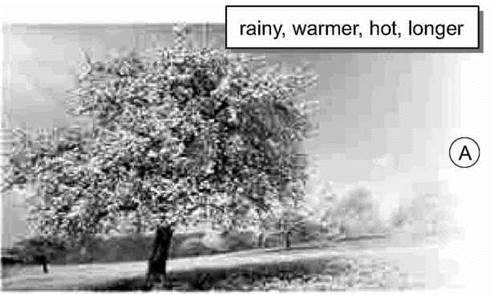
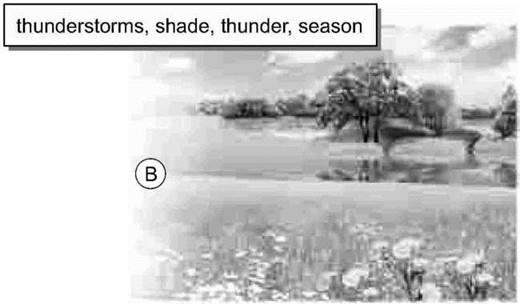
In summer the temperature is at its highest. In this… there’s little rain
In autumn the weather begins to… down. The leaves turn from green to orange, red and brown and then they… off. Many birds… south to spend the winter in warmer places. The days slowly cool down and get shorter and shorter. There’s more rain than in summer so rivers sometimes….
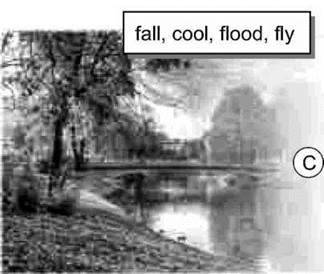
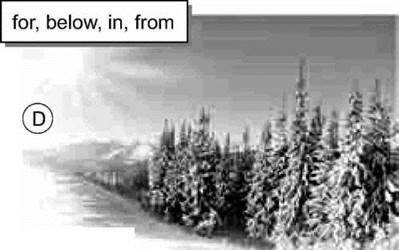
In winter there’s ice and snow, especially… the mountains. The temperature is low, often… freezing.
You have to wear warmer clothes to protect yourself… the cold. There’s not much sunshine and the days are very short. The soil rests and prepares… a new beginning.
3 Say if the sentences true or false.
1 It can be sunny and rainy in spring.
2 Many birds fly south in autumn.
3 People often sit
4 There’s more rain in autumn than in summer.
5 There isn’t any snow in the mountains in winter.
6 The soil rests in spring.
7 Summer is a season of thunderstorms.
4 Do the months quiz in pairs. Take turns.
1 The first month of the year is…
2 We have school holidays in…
3 The first summer month is…
4 The shortest month is…
5 We have Christmas in…
6 The first autumn month is…
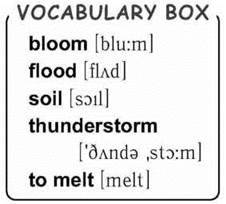
LISTENING
1 Ask and answer in pairs.
1 In what month does it often rain?
2 In what season are the trees not only green? What colours are they?
3 Do you often play indoors in autumn? Why?
4 Do you like autumn? Why?
5 What changes in Nature do we have in spring?
6 What is your favourite season?
2 Listen and guess the season.
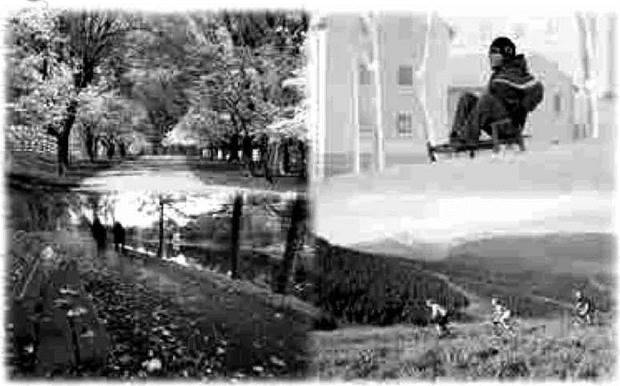
3 Ask and answer in pairs.
1 Do we go to the seaside in autumn?
2 Do we go skating in winter?
3 Do we gather mushrooms in winter?
4 Do we wear warm clothes in summer?
5 Do we carry umbrellas in autumn?
6 Do we make a snowman in spring?
7 Do we pick apples in winter?
4 In a group talk about your most favourite month of the year. Use the example below.
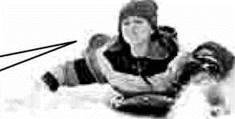 January is usually rather cold. There is some snow and it is frosty. There may be some winds in January too. January is my favourite month because I can have lots of fun, I like playing with snow on my winter holidays.
January is usually rather cold. There is some snow and it is frosty. There may be some winds in January too. January is my favourite month because I can have lots of fun, I like playing with snow on my winter holidays.
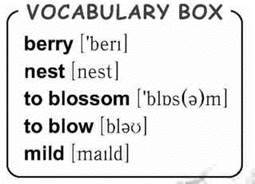
5 Listen and read the poem.
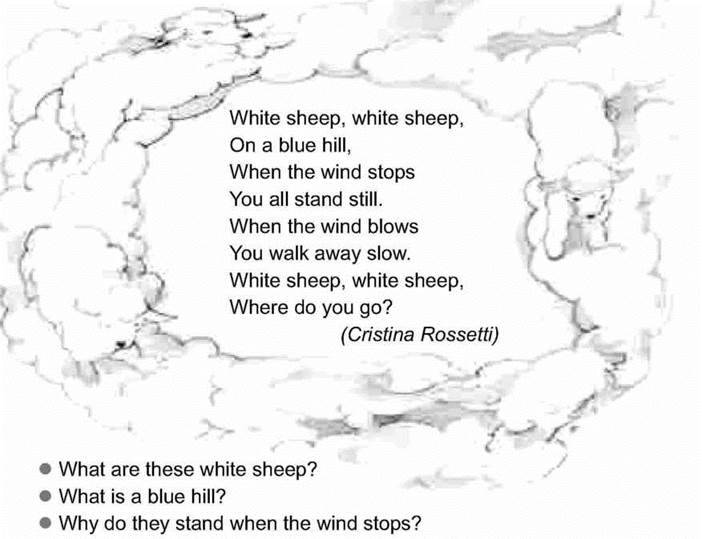
SPEAKING
1 Speak on the changes that happen when seasons change.
2 Think about the place you like to visit and describe it.
– what places you like to walk in and what you can find there to watch;
– what it is nice to watch in spring / summer / autumn and winter.
3 Discuss in a group.
1 Do you take care of plants and animals?
2 What do you do to keep gardens, yards and parks clean and beautiful?
3 How do you take care of nature?
4 What must you not do if you want to keep nature beautiful?
5 Can you make bird-houses?
6 What can you learn if you keep your eyes and ears open?
7 Did you plant a tree anywhere? When did you do it? Are you going to plant some more trees?
8 Do you teach younger children to love nature?
9 Did you learn anything interesting when you were in the wood (at the river, at the seaside, at the lake)? What was it?

WRITING
1 Complete the sentences in a way that is true for you.
– Windy days are fun because…
– When the sun shines, I feel…
– I love the snow because…
2 Write a paragraph about your favourite season.
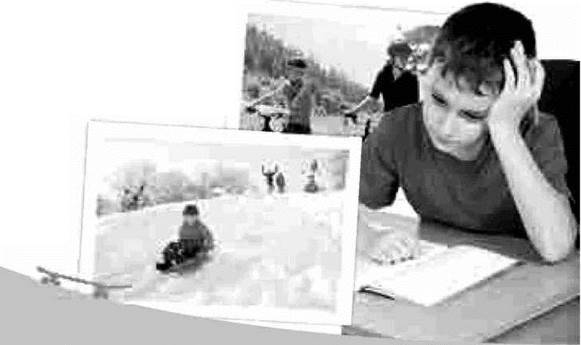
LOOK BACK!
1 Read and guess what the weather is like.
1 I’m wearing my waterproof boots and a jacket.
I can’t go out without my umbrella.
2 I’m wearing flip-flops, shorts and a top. But it doesn’t help.
3 I can’t go out of the house.
Leaves and papers are flying all around.
4 We are planning a picnic, but I don’t think we can go.
Look at the sky – it’s completely grey.
5 I can’t see a thing. It’s pretty scary to be in the car.
6 The children in my street are so happy.
Soon they can make a snowman.
2 Remember about Cathy’s outdoor school, match and copy.
1 Last week Cathy was
2 Cathy’s favourite activity
3 Rock climbing is
4 The food was OK the mushrooms were
5 The instructors were
6 The mornings were cold but Cathy’s bag
7 The weather was
A) a piece of cake for Cathy.
B) delicious but the beans were уuску1.
C) was rock climbing.
D) was full of warm clothes.
E) glorious the whole week.
F) at outdoor school with her class.
G) strict.
3 a) Listen about kids’ outdoor activities and choose the right answer.
1 The children stay… every spring.
A) in the country
B) at the seaside
2 They go with…
A) Paco
B) their teacher
1yucky – огидний
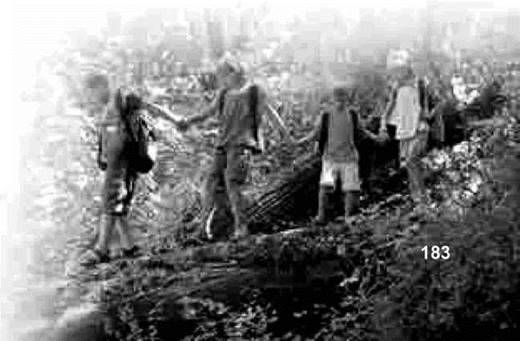
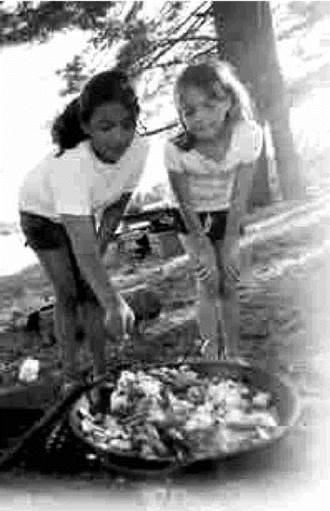
3 Tom… puts up the tent.
A) sometimes
B) always
4 Luka…
A) misses his cat
B) misses his CDs
5 Lolly teases Jasmine because she is…
A) afraid
B) wise
6 Melanie tells stories…
A) about a wise old Indian
B) about her friends in America
7 Paco says the trees and animals are our
A) fathers and mothers
B) brothers and sisters
4 Complete the dialogue with the words from the box.
Snow, warm, umbrellas, cold, rainy, dry
Mary: I don’t think we should go on a long walk in this weather.
Ann: Yes, perhaps we were a bit foolish to think of that.
It’ll be too… and….
Mary: Maybe we should just go for a short walk around the lake.
Ann: That’s a better idea. Do you think we should take our…?
Mary: Yes, you are right. It’ll be windy and the temperature will drop.
Ann: Do you think there will be…?
Mary: No, I don’t think so.
Ann: Let’s go to the cinema. It’s… there and… .
Mary: Well, we can do that later, but let’s go for a walk first. A bit of fresh air will do us good.
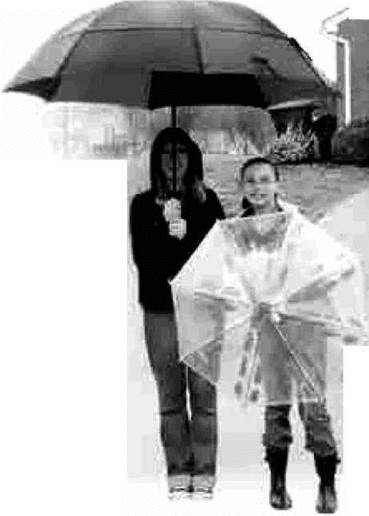
5 Say if it is true or false.
1 Mary and Ann had a plan to go for a long walk.
2 Mary doesn’t want to go for a walk because of the weather.
3 Ann wants to take umbrellas.
4 Mary doesn’t think there will be snow.
5 Girls think about going to the circus.
6 Girls agreed about a short walk around the lake.
7 They are going to take compass.
6 Act out the dialogue in task 4 in pairs.
7 Speak in a group.
– Do you sometimes go on a camping trip?
– What do you take with you?
– What do you do there?
– Do you like it? Why?
8 Agree or disagree. Prove your answer. Work in pairs.
1 There are a lot of interesting things around you in the woods, in the mountains, at the seasides and at the rivers.
2 Children must keep their eyes open to see and to learn interesting things around them.
3 You must teach your younger brothers and sisters to see interesting things around them.
4 People must take care not only of animals and birds.
People must take care of plants, seas, lakes, rivers and pools.
9 Choose the item and explain what it means in 5-6 sentences.
1 Nature is full of surprises.
2 The Earth is our home.
Let’s take care of it!
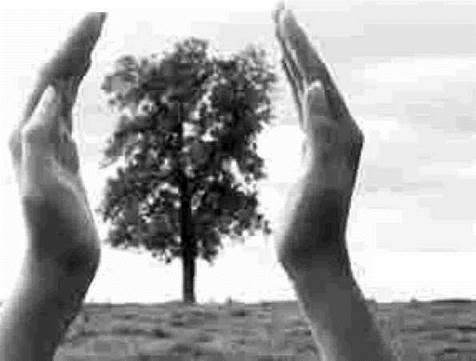
1 Listen and read.
THE SELFISH GIANT1
After O. Wilde
Once upon a time there lived a Giant.
He had a beautiful garden. Birds sang songs there.
Every day children came to his garden and were happy there.
But one day when the Giant saw the children he got very angry. He built a large wall around and told the children not to come.
Then spring came. There were a lot of flowers and birds in all gardens. But it was winter in the selfish Giant’s garden.
The Giant thought that the spring was late.
Then summer came to all gardens. But there was snow in the Giant’s garden. There were not green trees or flowers.
Autumn gave fruit to every garden. But only a cold wind and white snowflakes danced in the trees of the Giant’s garden.
One morning the Giant heard beautiful music in his garden. It was the song of a little bird. He went into the garden. All those trees were white. But there was a green tree in one comer of his garden. There was a little bird singing in the tree. The Giant saw a little boy under it. He could not get up on the tree. Now the Giant understood why spring did not want to come.
The Giant put the boy up in the tree. The big tree became green. The birds flew to that tree. The boy was happy. The Giant was happy, too. He said to the children, “Now it is your garden.”
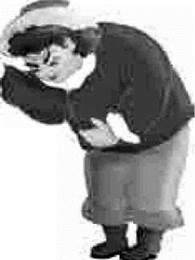
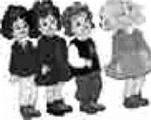
1a giant – велетень
2 Answer the questions.
1 What did the children do in the garden?
2 What was the Giant’s garden like in spring, summer and autumn?
3 Why didn’t spring come to the garden?
4 What did he see one morning?
5 What did the Giant do and say?
6 What do you think about the Giant?
3 Look at the pictures and tell the story.
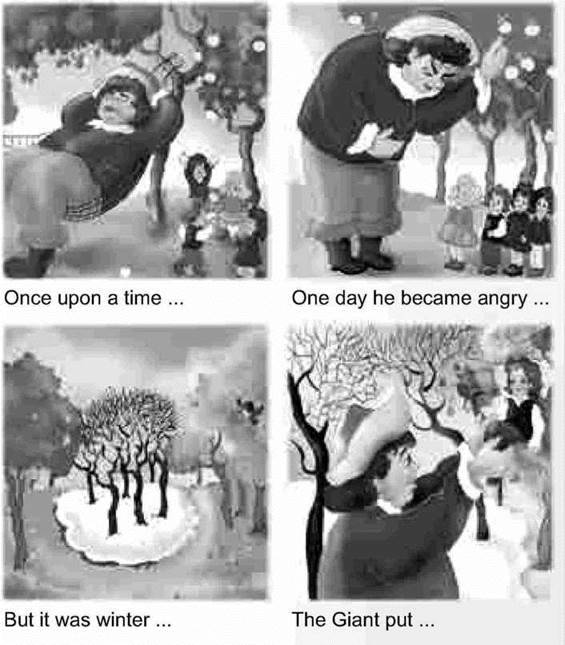
My Learning Diary
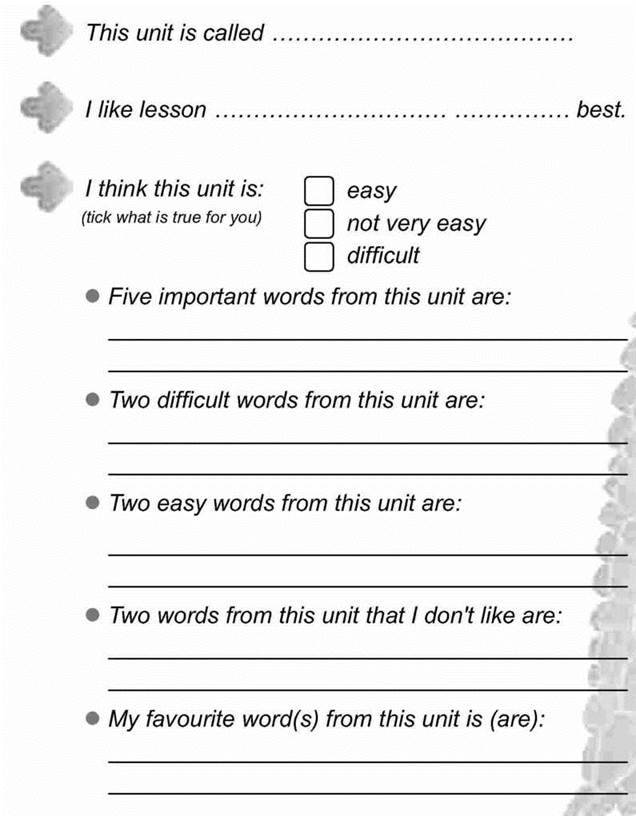
My Learning Diary
After the unit I can:
(tick what is true for you)
NOW I CAN |
– name items of clothes |
– say what outdoor activities children like doing |
– say what the weather is like |
– describe somebody’s clothes |
– ask and answer about the weather |
– read and understand weather forecast |
– listen and understand weather report / forecast |
– talk about the clothes that are better to put on in different situations |
– tell about activities I had on my outdoor trip |
– say some facts about nature |
– plan a trip outdoors |
– describe nature in each season |
– use Present Continuous and Present Simple Tenses |
– understand and use Wh-questions in Past Simple Tense |
– write a postcard from a holiday place |
– write a paragraph about my favourite season |
MY WORK |